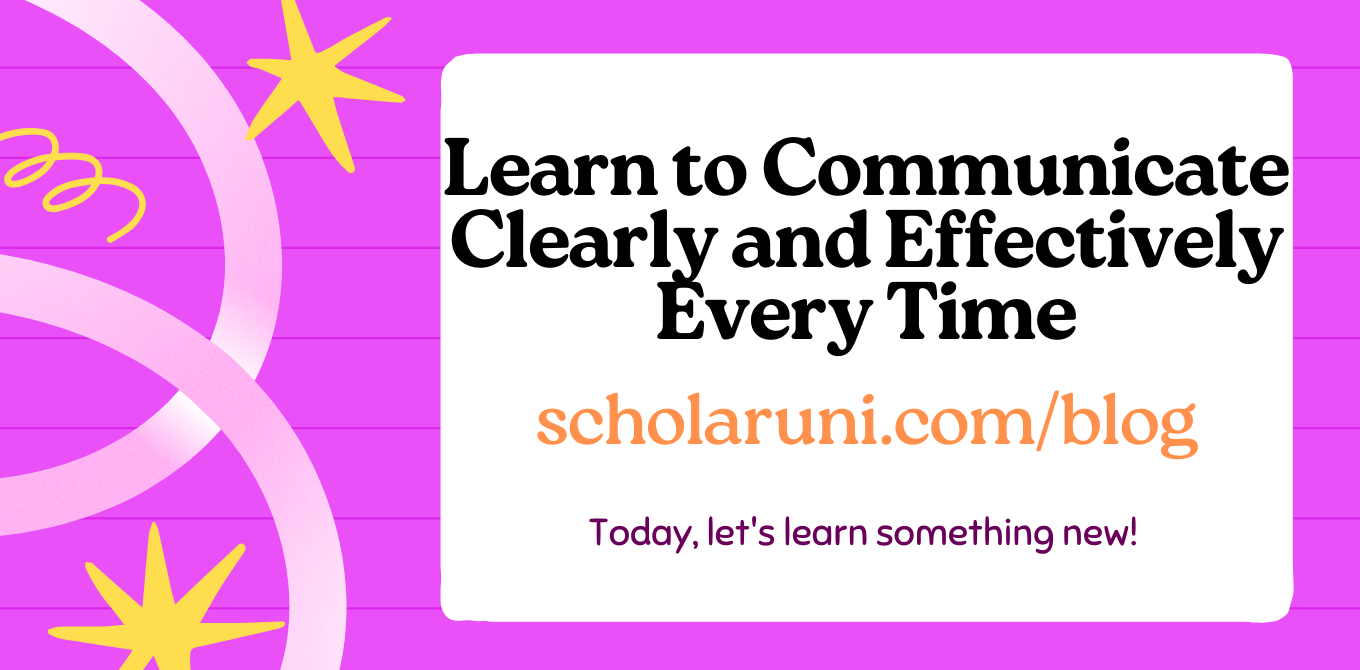
Yourself
Learn to Communicate Clearly and Effectively Every Time
Admin | Nov. 17, 2024, 9:26 a.m.
A family or profession without communication would be pointless, as communication plays an important role in all activities. Be it making a presentation at a board meeting, negotiating around an issue, or just having casual talks, one can always resolve disagreement through communication. While some seem graced with a natural talent for communication, it is within practice that every individual can develop and enhance their communication capabilities. This manual provides insight into the various techniques, gains, and downsides of practicing and mastering communicating with people.
Why Clear Communication is Important
In general, effective communication prevents misunderstandings or confusion that has the potential to arise when a message is conveyed. Quite unfortunately, these instances involve poor communication, which could manifest either in the corporate perspective or personally. It widens the options for improving relationships, encourages teamwork, and also enhances trust levels when individuals communicate effectively.
The Pillars of Effective Communication
Mastering conversation requires know-how and imposing its center components:
1. Clarity:
• Use easy, trustworthy language.
• Avoid jargon or overly complex terms unless important and understood by means of your audience.
• Structure your message logically with a clean introduction, frame, and end.
2. Active Listening:
• Focus fully on the speaker without interrupting.
• Show empathy and expertise via nodding or offering verbal affirmations.
• Ask clarifying inquiries to make certain comprehension.
Three. Empathy:
• Put yourself in the listener's footwear to better tailor your message.
• Be touchy to their feelings, cultural historical past, and views.
4. Non-Verbal Communication:
• Pay interest to body language, facial expressions, and tone of voice.
• Maintain eye touch to bring self-belief and engagement.
• Use gestures to emphasize key factors without distracting from the message.
5. Feedback:
• Invite and provide optimistic feedback.
• Confirm information by way of paraphrasing or summarizing
Techniques for Fostering Effective Communication
Effective communication is a continuous process. Here are some doable actions to assist:
- Recognize Your Audience:
- Adjust your examples, phrasing, and tone to suit their needs.
Take into account cultural variations and favored modes of communication.
- Engage in Active Listening:
- Focus entirely on the speaker.
- Consider what they said before answering.
- Do not consider your response while they are still speaking.
- Arrange Your Thoughts:
- Prepare your message beforehand, particularly for official correspondence.
- To make sure you cover important ideas, use tools like outlines or bullet points.
- Be Brief:
- Cut out extraneous information.
- To keep your audience interested, stick to the essentials.
- To keep your audience interested, stick to the essentials.
- Request Feedback:
- Get opinions on your communication style from friends, mentors, or coworkers.
- Utilize their recommendations to improve your strategy.
- Make Good Use of Technology:
- Make use of resources like presentation aids and grammar checks.
- Steer clear of relying too much on digital communication; for delicate subjects, give in-person conversations priority.
Getting Past Typical Communication Obstacles
Even the best communicators encounter difficulties. Communicating more successfully can be achieved by identifying and removing these obstacles.
- linguistic and Cultural Differences:
- Acquire knowledge about the linguistic preferences and cultural norms of your audience.
- Steer clear of expressions or idioms that can be difficult to interpret.
- Emotional Triggers:
- Remain composed and quiet, particularly during contentious conversations.
- To communicate your emotions without placing blame on others, use "I" statements.
- Distractions:
- Reduce outside noise and disturbances.
- Make sure the venue and time are suitable for the discussion.
- Assumptions:
- Do not assume that your communication has been comprehended before getting confirmation.
- Ask your audience for comments or questions on a regular basis.
Emotional Intelligence's Function
Emotional intelligence (EI), which includes social skills, self-awareness, self-regulation, and empathy, is directly related to effective communication. Having a high EI makes it easier to control your emotions and comprehend those of others, which facilitates more fruitful communication.
Advice for incorporating emotional intelligence (EI) into communication:
• Before speaking, acknowledge and control your feelings.
• Modify your message according on the emotional state of the audience.
• Establish rapport by having mutual trust and understanding.
In the Digital Age, Communication
As technology has advanced, social media, emails, and texts have become increasingly common ways for us to communicate. Digital instruments are convenient, but they also come with special difficulties.
1. Writing Clarity:
- Make use of brief paragraphs and sentences.
- Check for mistakes and ambiguity.
2. Tone:
* Pay attention to how your statements could be understood without using your voice or your face.
* To express emotion, use punctuation or emojis sparingly.
3. Timeliness:
* React to critical messages as soon as possible.
* Steer clear of needless delays that can impede cooperation.
Developing Your Communication Skills
It takes constant work to get better at communicating. Here are some methods for practicing:
- Role-playing:
- Act out dialogues or presentations with a mentor or friend.
- To gain confidence, try out various situations.
- Join Public Speaking Groups:
To get experience speaking in front of an audience, join groups like Toastmasters.
- Record and Review:
* Record your speech to pinpoint places where your tone, tempo, and clarity need to be improved.
- Get Knowledge from Professionals:
* Attend courses on effective communication or watch TED Talks.
5. Read and Write Frequently:
* Regular reading and writing exercises can help you increase your vocabulary and sharpen your articulation.
Assessing Your Development
Assess your communication abilities by looking at the following results:
• Are your messages consistently understood?
• Are you handling disputes more skillfully?
• In meetings or conversations, do others react favorably to your contributions?
- As you improve your skills, ask for feedback frequently and acknowledge minor accomplishments.
In conclusion
Gaining the ability to communicate effectively and clearly is a lifelong process with many benefits. You may strengthen relationships, enhance teamwork, and accomplish your personal and professional objectives by engaging in active listening, embracing empathy, and honing both verbal and non-verbal cues. Recall that effective communication involves more than just speaking; it also involves making sure your message is understood and results in deep connections.
Related To the blog
Learn More about Yourself.
Learn to Communicate Clearly and Effectively Every Time
A family or profession without communication would be pointless, as communication plays an important role in all activities. Be it making a presentation at a board meeting, negotiating around an issue, or just having casual talks
The Most Common Scams and How to Protect Yourself
Scams are unfortunately a common occurrence worldwide. While the specific tactics may vary, the underlying goal remains the same: to deceive individuals or businesses into parting with their money or personal information

Scholarships Guide: How do Scholarships work and How Can you apply for one
Scholarships are given out by groups or individuals to students they believe best fit the profile of their ideal applicant
Last updated 834 days ago
Touch with us
Get Exclusive Latest Updates That We Only Share With Email Subscribers.
scholaruni
